Period:
Yugoslav Wars
Region:
Bosnia and Herzegovina
The Bosnian Muslim leader and criminal Alija Izetbegović
Alija Izetbegović (1925-2003) was the former president of the Presidency of Bosnia and Herzegovina, later wartime commander of Bosnian Muslims, founder and first president of the Muslim extremist Party of Democratic Action, author of the famous "Islamic Declaration", according to which Bosnia and Herzegovina was conceived as an ethnic and religiously pure state.
In socialist Yugoslavia, he was imprisoned twice for his chauvinistic ideas and nationalist-clerical outbursts.
In the first elections in Bosnia and Herzegovina on November 18, 1990, he received twice the amount of votes as Fikret Abdić.
In Lisbon in April 1992, he first signed a document on a peaceful solution to the political crisis in B&H, but after talks with US diplomat Warren Zimmerman, he withdrew his signature and dragged the people of Bosnia and Herzegovina into war and an unimaginable catastrophe.
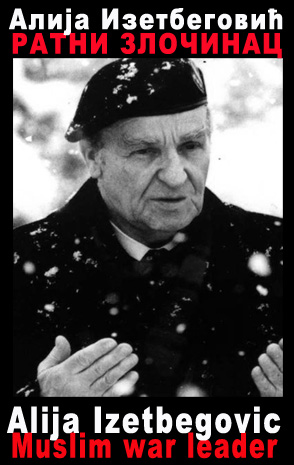
He was involved in numerous crimes, which he ordered to be carried out by Sarajevo criminals (Caco, Celo, Juka, etc.) or mujahideen who came from Arab countries in the 1990’s, during the Bosnian war.
He was one of the key figures during the break-up of the second Yugoslavia in the 1990s, that is, in the late 20th century.
BIOGRAPHY
Alija Izetbegović's origins are in Belgrade, where his ancestors came from. After the establishment or renewal of the Serbian state, they came to Bosanski Šamac in the 1850s.
They stayed there for some time, where Alija was born on August 8, 1925. His father decided in 1928. to move from Bosanski Šamac to Sarajevo.
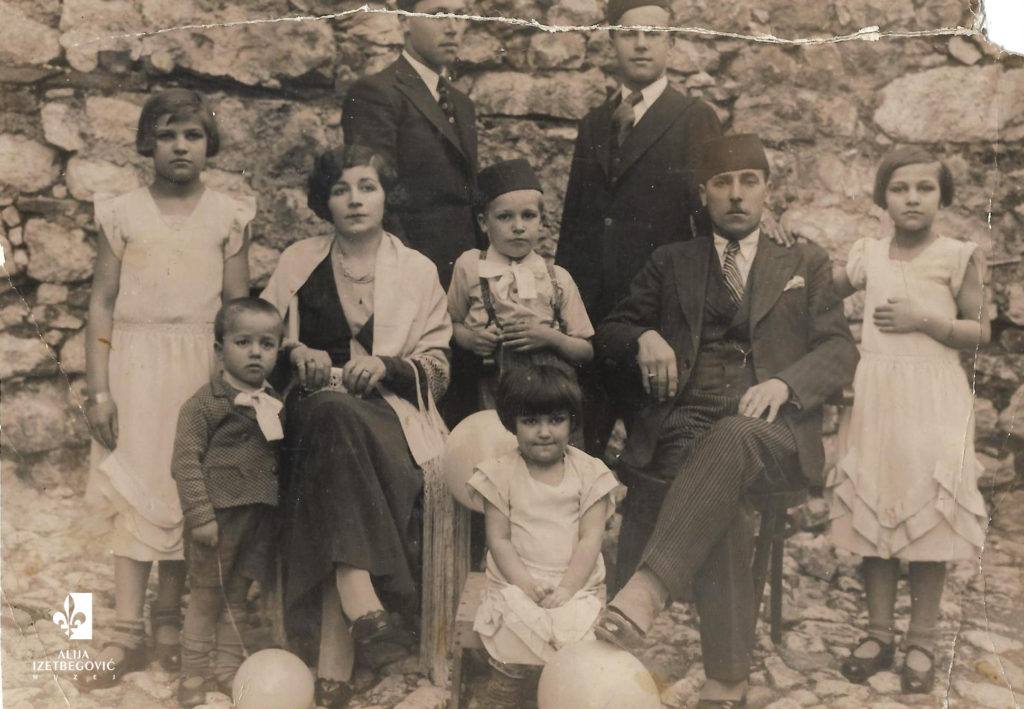
From the family album: Izetbegovićs in the late 1930s
After the Izetbegović family moved to Sarajevo, Alija attended high school in the 1930s. During World War 2, he was active in Muslim extremist associations as a member of the Islamic-fanatical organization "Young Muslims", a pro-Nazi faction that supported the Ustasha unit, Handzar- division for which in 1946. he was sentenced to three years in prison.
Two relatives of his wife Halida Repovac, died as partisan fighters during World War 2. He married Halida in 1950. and together they had three children: two daughters and one son, Bakir (1956.) ...
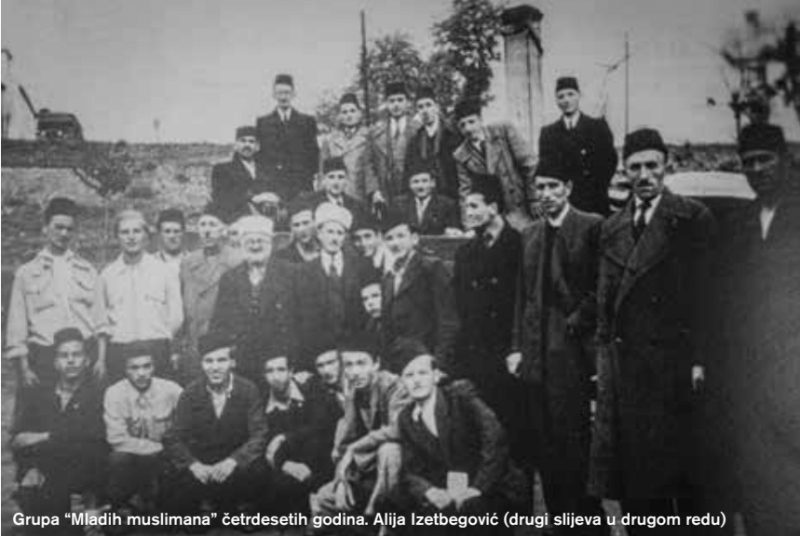
Young Muslims, extremism and anti-secularism
After serving his sentence, he initially enrolled in agronomy, but soon decided to study law instead. He graduated in 1956 and got a job in the factory "Bosna", where he spent almost thirty years.
Although he passed the bar exam in 1962, Alija never practiced law professionally.
Writing activity
Alija Izetbegović profiled himself politically by the end of the 1960s, when he wrote the political-religious program "Islamic Declaration" (1970), in which he advocated a state system based on the principles of Sunni Islam.
This work is visibly pan-Islamist: Izetbegović's utopia is a proclamation of Muslim rule and a rejection of both the totalitarian communist and the secular-democratic Western social and political model.
The essence of that declaration is the merging of radical Islam with the pro-Western way of life.

Memories from prison, 1946.
In 1980, Izetbegović published his most important work, "Islam between East and West". This book can be characterized as a historical-philosophical consideration of the position of Islamic civilization, especially in the context of secularization and the mixture of science, technology and political democracy that revived the West. It pushed the Christian identity into the background - a process that the author correctly assumed would be corrosive to the religious composition of countries with a majority Muslim population.
Izetbegović's position is both conservative and contradictory: he advocates for the preservation of specifically Islamic features of society, but it remains unclear whether these characteristics are compatible with the universal principles of political democracy, which he did not directly condemn.
During 1983, Alija Izetbegović was sentenced at a political trial in Sarajevo (along with several other like-minded people) for "Muslim nationalism" and "hostile propaganda" to 14 years in prison, meaning he should have stayed in prison until 1997.
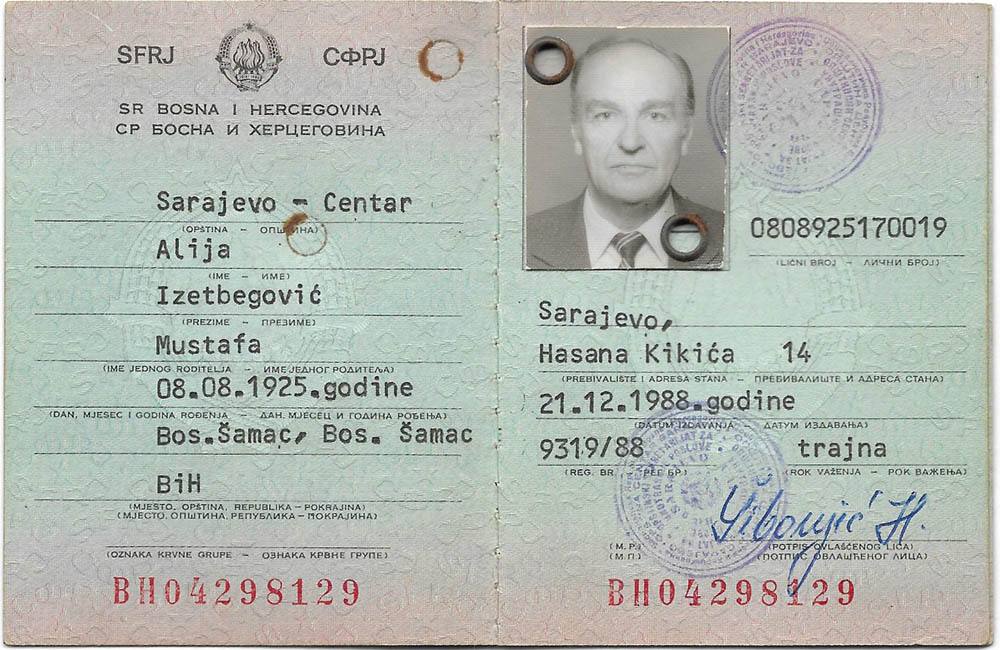
Personal documents issued upon release from prison
It remains quite unclear how he was released so soon after serving only part of his sentence in Zenica Prison, i.e. in 1988, and even less how he was permitted to engage in politics or the struggle for power two years later, given why he was convicted before the State Court.
POLITICAL ACTIVISM
Alija Izetbegović founded the Party of Democratic Action in 1989, as the national political party of Muslims. In the first multi-party elections in Bosnia and Herzegovina, in November 1990, after more than half a century, the SDA won 33% of the seats in the new parliament as the single strongest party in B&H.
The SDA can thank Fikret Abdić, a successful businessman from Velika Kladuša, for these votes. He was a charismatic person and received twice as many votes in those elections as Alija Izetbegović.
However, it was not only a trap for Muslims, but also for Serbs from B&H. Izetbegović was a controversial person, with two prison terms and chauvinistic outbursts. Due to political pressure from the extreme wing of the SDA party, Fikret Abdić retires, and Alija Izetbegović becomes the president of the Presidency of Bosnia and Herzegovina.
After the elections, the SDA party formed a coalition with the Croatian militant party HDZ and the Serbian SDS. Thus, a coalition was formed, which lasted barely 15 months, until the beginning of the war in B&H.
Alija Izetbegović, as the President of the Presidency of B&H, was an active participant in conferences for the preservation of the SFRY, together with the other presidents of republics.

Memories from one of the meetings for breaking up the SFRY
He advocated that Bosnia and Herzegovina should not remain in a truncated Yugoslavia, but should have the same right to self-determination as all of the other former republics. Following the failed February referendum on independence, in March 1992, B&H declared secession, which was recognized by the United States and the countries of European Union in April 1992.
After the collapse of the Lisbon Treaty, under the patronage of the Portuguese diplomat Jose Coutilier, who foresaw the reorganization of B&H on the principles of national cantonization, the Croatian, Serbian and Muslim sides signed the agreement. However, Izetbegović withdrew his signature after two months (at the urging of American diplomat Warren Zimmerman) which triggered the beginning of a bloody war in the entire territory of Bosnia and Herzegovina.
On 2 May 1992, Alija Izetbegović was briefly arrested by the JNA Military Police, but was released the following day. This happened in Sarajevo, while dramatic events and crimes in Dobrovoljačka Street against members of the JNA from Muslim paramilitary formations continued.
The political program of the SDA led by Izetbegović was a unitary ("united") Bosnia and Herzegovina without internal structures based on the national principle. This policy, which was perceived by Serbs and Croats as an attempt at Muslim domination through a centralized B&H in which Muslims had a relative majority, caused aversion among the Croat and Serb populations.
The Croatian side feared the strengthening of central power, which reminded them of Serbian centralism from the time of the Kingdom of Yugoslavia, while the Serb population feared the possible recurrence of mass crimes committed against them in B&H during World War 2 by Muslim and Croat (fascists) Ustasha.
Rising tensions between the three largest nations in B&H, as well as a large number of individual incidents, erupted into a general civil war on the territory of B&H. Bosnia and Herzegovina, as the second Muslim state in the Balkans after Turkey, and its president Alija Izetbegović, sought help from rich Arab, Muslim states.
During the war, Izetbegović cooperated with Islamic extremist organizations, including Osama Bin Laden's Al Qaeda, when he personally received them in Sarajevo in 1994. Osama bin Laden's visit to Sarajevo and his meeting with Alija Izetbegović was revealed by the German journalist for the German Spiegel magazine, Renate Flotau, who was waiting for an interview outside of the office of the then the most powerful man in Sarajevo and accidentally bumped into Bin Laden.
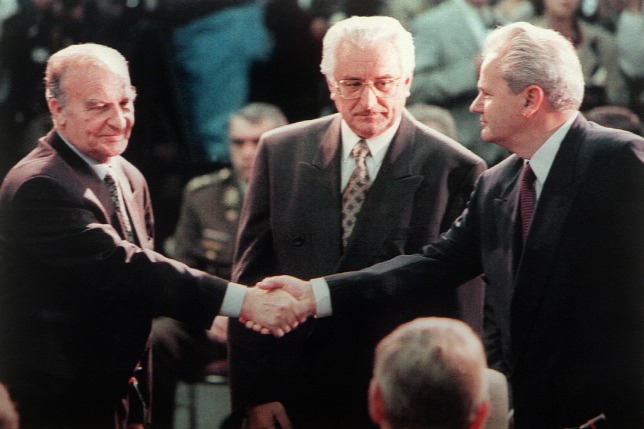
Late Lisbon in Dayton, after three and a half years
Izetbegović, Tuđman and Milošević
The course of the war in Bosnia and Herzegovina led to the adjustment of Izetbegović's policy to the realities on the ground. After several failed truces, a peace agreement was reached in the American city of Dayton in 1995 between Izetbegović as the representative of Muslims, Milosevic as the representative Serbs from B&H, and Tudjman as the representative of Bosnian-Herzegovinian Croats.
So Izetbegović recognized the Republika Srpska as the second entity of B&H, while he had to create a Federation with the Croats.
WAR CRIMES AND GENOCIDE
In August 1991, Alija Izetbegović, together with his close associates: Haris Silajdžić and Ejup Ganić, made a plan for the import of weapons and the formation of Muslim paramilitary formations, which would fight for the independence of B&H, because Izetbegović himself knew that the separation of B&H from SFRY would not go easily or in a peaceful way.
Thus, by his order, in September and October 1991, the "Green Berets" and the "Patriotic League" were formed in most Muslim municipalities in B&H. This later in 1992 grew into the Muslim, so-called Army of Bosnia and Herzegovina.

Ramiz Delalić sad: "I killed for Alija!"
Sarajevo criminal and drug dealer Ramiz Delalić Ćelo stated that he received an order and a promised reward from Alija Izetbegović, if he killed several Serbian wedding guests in Sarajevo at the Bas-čaršija on March 1, 1992, which he did. This led to the boiling of national tensions in B&H. The police refused to conduct an investigation and arrest Delalić ... thus starting a bloody civil and religious war in B&H, that lasted until the end of 1995.
Alija Izetbegović is one of the main organizers of the crimes committed by Muslim paramilitary forces against members of the JNA, who withdrew from Sarajevo on May 2 and 3, 1992 (Dobrovoljačka Street) and two weeks later in Tuzla on May 15, 1992 at Brčanska Malta.
Immediately after the start of the war in Bosnia and Herzegovina, Islamic extremists came from Arab countries - mujahedeen from Afghanistan, Saudi Arabia, Egypt, Sudan, Algeria, Pakistan, Tunisia, Morocco ... to fight for Jihad (the holy war of Muslims against infidels).
Alija Izetbegović visited those mujahedin and encouraged them to stay and fight against Christians (first Serbs and later Croats). The mujahedin brought trophies to Alija Izetbegović in the form of the severed heads of Serb civilians and fighters, which he kept in his office while performing the function of president.
Most of the pre-war Sarajevo criminals, Musan Topalović Caco, Ramiz Delalić Ćelo, Jusuf Juka Prazina, Ismet Bajramović Ćelo and others, were regular guests of Alija Izetbegović, to whom he often gifted valuables or money, because they served him to do the dirtiest jobs.
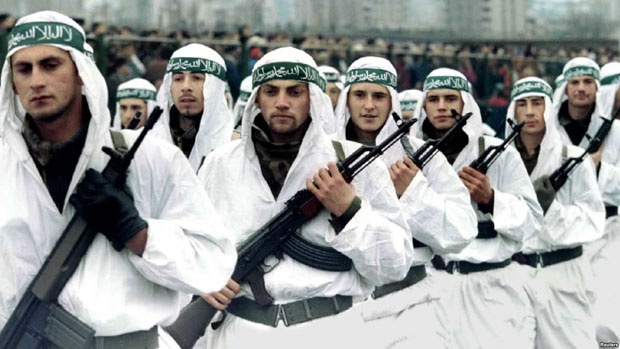
The rise of Allah's warriors from Asia and Africa to fight for Jihad
Alija Izetbegović actively cooperated with Bosnian-Herzegovinian Croats until the summer of 1993 and later during 1995, when Muslim-Croat forces carried out a series of ethnic cleansings against the Serbian population in B&H: Bradina, Sijekovac, Mostar, Višegrad, Goražde, Bihać, Mrkonjić grad, Derventa, Zenica, Tuzla ...
Muslim forces committed incredible atrocities in Srebrenica and Sarajevo, which they later tried to hide, or represent as those committed by Serbs against Muslims ?!
In 1992-1993, the Muslim army formed a special chemical weapons factory "Behar", which they used against the Army of the Republika Srpska, contrary to the Geneva Convention on War of 1947. This was well known by Alija Izetbegović, as well as Ejup Ganić and Haris Silajdzić.
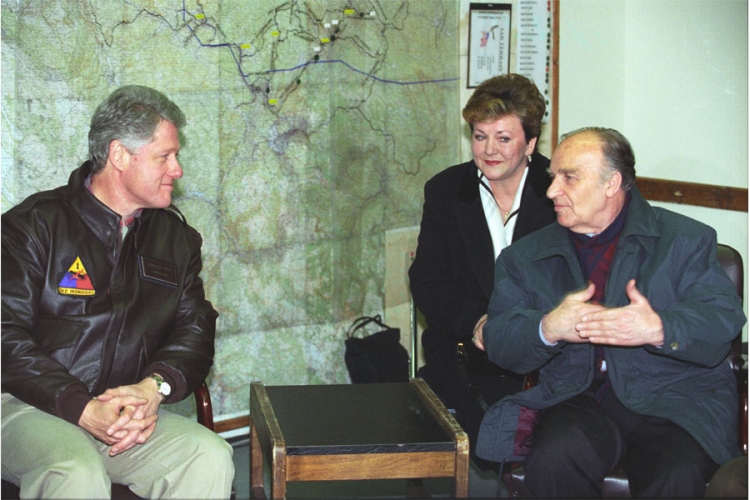
Meeting with Bill Clinton (president of USA) 1993:
That is how Srebrenica was agreed
Also, Izetbegović knew about the existence of a large number of concentration camps (Silos, Central Prison, Musala, "Viktor Bubanj", Čelebići, etc.) for Serbs in Bosnia and Herzegovina, which were controlled by Muslims, and he did nothing to prevent that. He even visited some of them in person.
In Sarajevo alone, there were over 120 camps for Serbs.
His war units have also been accused of destroying more than 200 Orthodox churches and temples of cultural and historical significance in Bosnia and Herzegovina.
AFTER THE WAR
After the Dayton Accords in 1995, Alija Izetbegović remained active as SDA president and co-president of the Muslim-Croat Federation of B&H, but according to agreement, the real power passed into the hands of a high representative of the "international community" (essentially, the US and the EU).
Due to deteriorating health, Izetbegović withdrew from politics in 2000, but retained a decisive influence on shaping Muslim politics.

The biggest funeral in Sarajevo ever
On October 19, 2003, Izetbegović died of alleged complications caused by worsening heart disease. His funeral was attended by over 150,000 people, as well as numerous diplomatic delegations from France, the United States, Greece, Austria, Turkey, Macedonia, Croatia, Slovenia, Iran and Pakistan.
Alija Izetbegovic's funeral was overshadowed by information that the International Criminal Tribunal for the former Yugoslavia in The Hague is considering indicting him for war crimes committed by Islamic mujahideen against the Croatian and Serbian people and captured soldiers in the Bosnian war in the 1990s.
THE INDICTMENT FROM THE HAGUE
The original indictment, filed on December 16, 1996, was returned from the Hague Tribunal. Chief Prosecutor Louise Arbor explained that it did not contain enough evidence to suggest that Alija Izetbegović had committed a grave violation of international humanitarian law.
On November 2, 2001, the Prosecutor's Office of the Republika Srpska for Relations with the Hague Tribunal filed an extended indictment against Alija Izetbegović, who served as President of the Presidency of B&H during the war in B&H.
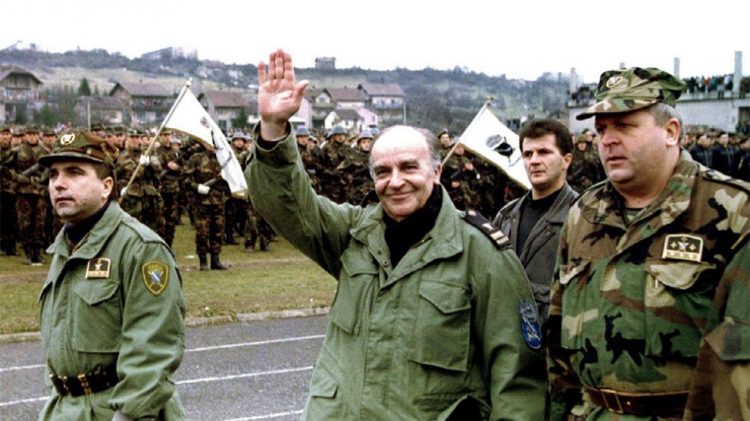
Special greetings to the criminals, who cleared Ozren
The indictment charges Alija Izetbegović with genocide, war crimes against civilians and prisoners, and destruction of cultural, historical and religious monuments, persecution and deportation of the non-Muslim population.
Along with the indictment, evidence was submitted to the Hague Tribunal:
• 300 criminal charges,
• 350 statements of witnesses heard before the courts of the Republika Srpska,
• 1,000 statements given by the Ministry of the Interior of the Republic of Srpska,
• 16 videos
• 9 audio tracks,
• 800 testimonies of civilians - disabled victims of grenades or snipers
• other evidence.
LEGACY
Although numerous pieces of evidence through the testimonies of the surviving victims clearly show that Alija Izetbegović was at the head of a JOINT CRIMINAL ENTERPRISE or genocide against Serbs in Bosnia and Herzegovina in the early 1990s, he still enjoys great support and gratitude in almost all Muslim social strata.
At mass gatherings of Muslims in recent years (weddings, matches, concerts, etc.) whether in Bosnia and Herzegovina or in the diaspora, you can often see his picture and hear songs in his honor.
Many streets, bridges and squares took his name in places such as: Bužim, Cazin, Donji Vakuf, Bihać, Gradačac, Kakanj, Kalesija, Ključ, Konjić, Maglaj, Zenica, Visoko, Sarajevo, Srebrenik, Tesanj, Tuzla, Zavidovići etc.
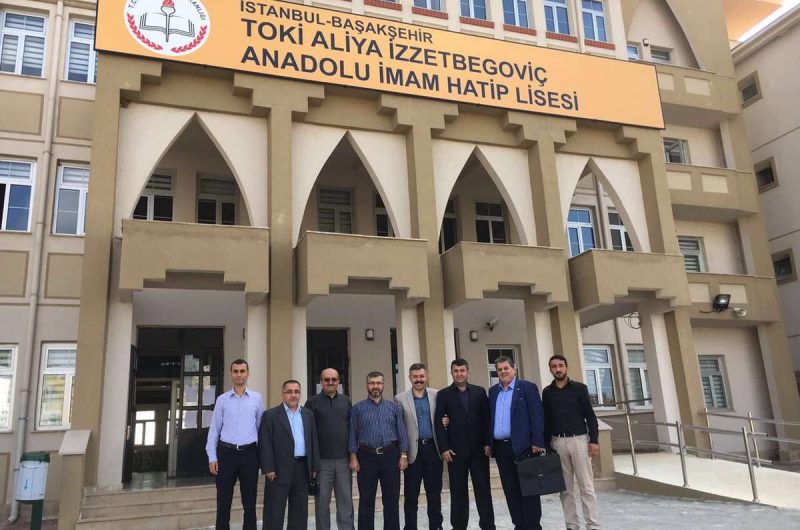
Istanbul appreciates its pollen
Not only the homeland, but many cities abroad have given names to student dormitories, boulevards, parks, cultural centers, museums after Alija Izetbegović... These include: Turkey, Saudi Arabia, Tajikistan, Northern Macedonia, the so-called Republic of Kosovo, Turkmenistan, etc.
In Istanbul, there is even a mosque with his name.
Tags:
Please, vote for this article:
Visited: 19117 point
Number of votes: 96
|